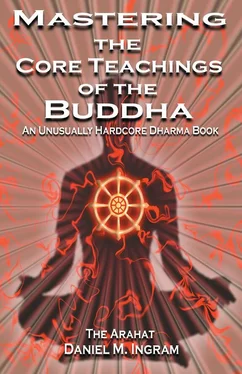Daniel Ingram - Mastering the Core Teachings of Buddha - An Unusually Hardcore Dharma Book
Здесь есть возможность читать онлайн «Daniel Ingram - Mastering the Core Teachings of Buddha - An Unusually Hardcore Dharma Book» весь текст электронной книги совершенно бесплатно (целиком полную версию без сокращений). В некоторых случаях можно слушать аудио, скачать через торрент в формате fb2 и присутствует краткое содержание. Год выпуска: 2009, ISBN: 2009, Издательство: Aeon Books, Жанр: Старинная литература, на русском языке. Описание произведения, (предисловие) а так же отзывы посетителей доступны на портале библиотеки ЛибКат.
- Название:Mastering the Core Teachings of Buddha - An Unusually Hardcore Dharma Book
- Автор:
- Издательство:Aeon Books
- Жанр:
- Год:2009
- ISBN:9781904658405
- Рейтинг книги:5 / 5. Голосов: 1
-
Избранное:Добавить в избранное
- Отзывы:
-
Ваша оценка:
- 100
- 1
- 2
- 3
- 4
- 5
Mastering the Core Teachings of Buddha - An Unusually Hardcore Dharma Book: краткое содержание, описание и аннотация
Предлагаем к чтению аннотацию, описание, краткое содержание или предисловие (зависит от того, что написал сам автор книги «Mastering the Core Teachings of Buddha - An Unusually Hardcore Dharma Book»). Если вы не нашли необходимую информацию о книге — напишите в комментариях, мы постараемся отыскать её.
Mastering the Core Teachings of Buddha - An Unusually Hardcore Dharma Book — читать онлайн бесплатно полную книгу (весь текст) целиком
Ниже представлен текст книги, разбитый по страницам. Система сохранения места последней прочитанной страницы, позволяет с удобством читать онлайн бесплатно книгу «Mastering the Core Teachings of Buddha - An Unusually Hardcore Dharma Book», без необходимости каждый раз заново искать на чём Вы остановились. Поставьте закладку, и сможете в любой момент перейти на страницу, на которой закончили чтение.
Интервал:
Закладка:
Fruition, and the two are easily confused for this and other reasons.
There is great variation in the specifics of what we are seeing and feeling when we cross this profound and intense event, but certain aspects of these events will be common to all practitioners. This event tends to manifest in a way that can mirror the Three Doors (described in a few chapters) at about the middle of the out breath, leading to an unknowing event, followed by a few exceedingly clearer and more distinct moments imparting some deep understanding of the Three Characteristics before a second unknowing event at the end of the breath. It is not uncommon for the A&P event to occur during a particularly lucid dream or at least in the middle of the night.
Now, it should be noted here that it is unlikely in these extreme moments for the sense of the breath to be particularly clear, but this is how things happen regardless. In these moments, most, but not all, of their sensate universe strobes in and out of reality, arises and passes.
The subtle background and sense of an observer still seems to stay stable. In contrast to this, the entrance to stage 15. Fruition is through one of the Three Doors, involves the complete sensate universe (background, time, space and all), happens at the end of the out breath, and does not involve two closely related unknowing events. (The usefulness of this information may become apparent later on.) Those who have crossed the A&P Event have stood on the ragged edge of reality and the mind for just an instant, and they know that 180
The Progress of Insight
awakening is possible. They will have great faith, may want to tell everyone to practice, and are generally evangelical for a while. They will have an increased ability to understand the teachings due to their direct and non-conceptual experience of the Three Characteristics.
Philosophy that deals with the fundamental paradoxes of duality will be less problematic for them in some way, and they may find this fascinating for a time. Those with a strong philosophical bent will find that they can now philosophize rings around those who have not attained to this stage of insight.
They may also incorrectly think that they are enlightened, as what they have seen was completely spectacular and profound. In fact, this is strangely common for some period of time, and thus may stop
practicing when they have actually only really begun.
This is a common time for people to write inspired dharma books, poetry, spiritual songs, and that sort of thing. This is also the stage when people are more likely to join monasteries or go on great spiritual quests. It is also worth noting that this stage can look an awful lot like a manic episode as defined in the DSM-IV (the current diagnostic manual of psychiatry). The rapture and intensity of this stage can be basically off the scale, the absolute peak on the path of insight, but it doesn’t last.
Soon the meditator will learn what is meant by the phrase, “Better not to begin. Once begin, better to finish!” as they are now too far into this to ever really go back. Until they complete this progress of insight, they are “on the ride” and may begin to feel that the dharma is now doing them rather than the other way around, as they will progress inevitably and relatively quickly, usually within days, into stages 5-10, which as you will shortly see, are not always a party. The rapture and all the bells and whistles die down quickly, and the meditator may even be left raw as if hung over after a night of wild partying. The clarity fades somewhat, and the endings of objects becomes predominant as they progress to knowledge of...
5. DISSOLUTION, ENTRANCE TO THE DARK NIGHT
Thus begins what are called the “Knowledges of Suffering” or “The Dark Night of the Soul” (to use St. John of the Cross’ terminology). I consider this the entrance to the third vipassana jhana, though U
Pandita considers this the entrance to the fourth vipassana jhana. I'll give 181
The Progress of Insight
my arguments for this later in the chapter that deals more directly with the vipassana jhanas.
The Dark Night spans stages 5 through 10 in this map, namely Dissolution, Fear, Misery, Disgust, Desire for Deliverance, and Re-observation. Stages 5 through 9 tend to “come as a package,” with one leading fairly quickly and naturally to the others. Stage 10, Re-observation, tends to stand out as its own distinct and often formidable entity. It should be noted that some pass through the Dark Night quickly and some slowly. Some barely notice it, and for some it is a huge deal, regardless of the speed at which one moves through these stages. Some may get run over by it on one retreat, fall back, and then pass through it with no great difficulties some time later. Others may struggle for years to learn its lessons.
I am going to describe the Dark Night largely in extreme terms, but realize that this is just to give a heads up to what is possible, not what is necessary or guaranteed. As before, on retreat these things are likely to be more intense and clear, though those on retreat who are able to keep practicing are likely to make much faster progress as well. On the other hand, practice in “daily life” can be powerful and sometimes very speedy. These things are strangely unpredictable. Enough disclaimers!
Once someone has crossed the Arising and Passing Event, one will enter the Dark Night regardless of whether one wants to or not. It doesn’t matter if you practice from this point on; once you cross the A&P you are in the Dark Night to some degree (i.e. are a Dark Night Yogi) until you figure out how to get through it, and if you do get through it without getting to the first stage of enlightenment, you will have to go through it again and again until you do. I mean this in the most absolute terms.
The Dark Night typically begins with just about all of the profound clarity, mindfulness, concentration, focus, equanimity and bliss of the previous stage dropping away. So also ends the cause-and-effect-like phenomena of the breath or walking shaking or jerking up and down in a way related to attention and noting, as well as all of the fine vibrations and vortex-like raptures. Early on, the frequency of vibrations disconnects from the cycle of the breath, remaining largely stable at 182
The Progress of Insight
whatever frequency is going on at that stage once they can be perceived again (in late Dissolution or Fear).
Whereas one might have felt that one’s attention had finally attained the one-pointed focus that is so highly valued in most ideals of meditation during the Arising and Passing Away, during the Dark Night one will have to deal with the fact that one’s attention is actually quite wide and its contents unstable. Further, the center of one’s attention becomes the very least clear area of experience, and the periphery becomes predominant. This is normal and even expected by those who know this territory. However, most meditators are not expecting this at all and so get blindsided and wage a futile battle to make their attention do something that, in this part of the path, it simply won’t do.
If one has ever been meditating in a place with lots of mosquitoes buzzing in one’s ears in a way that made it very hard to concentrate on the primary object, one can get a sense of what one’s attention will be like in the Dark Night. Rather than fighting against this and ignoring the metaphorical mosquitoes, one should try to understand what it feels like to have one’s attention be however it is. Just like listening to discordant, chromatic jazz with lots of jarring harmonies and instruments playing more at odds with each other than together takes some getting used to, the quality of attention in the Dark Night is an acquired taste, and the sensations that arise tend to be very rich, complex, broad and unsettling.
Читать дальшеИнтервал:
Закладка:
Похожие книги на «Mastering the Core Teachings of Buddha - An Unusually Hardcore Dharma Book»
Представляем Вашему вниманию похожие книги на «Mastering the Core Teachings of Buddha - An Unusually Hardcore Dharma Book» списком для выбора. Мы отобрали схожую по названию и смыслу литературу в надежде предоставить читателям больше вариантов отыскать новые, интересные, ещё непрочитанные произведения.
Обсуждение, отзывы о книге «Mastering the Core Teachings of Buddha - An Unusually Hardcore Dharma Book» и просто собственные мнения читателей. Оставьте ваши комментарии, напишите, что Вы думаете о произведении, его смысле или главных героях. Укажите что конкретно понравилось, а что нет, и почему Вы так считаете.












